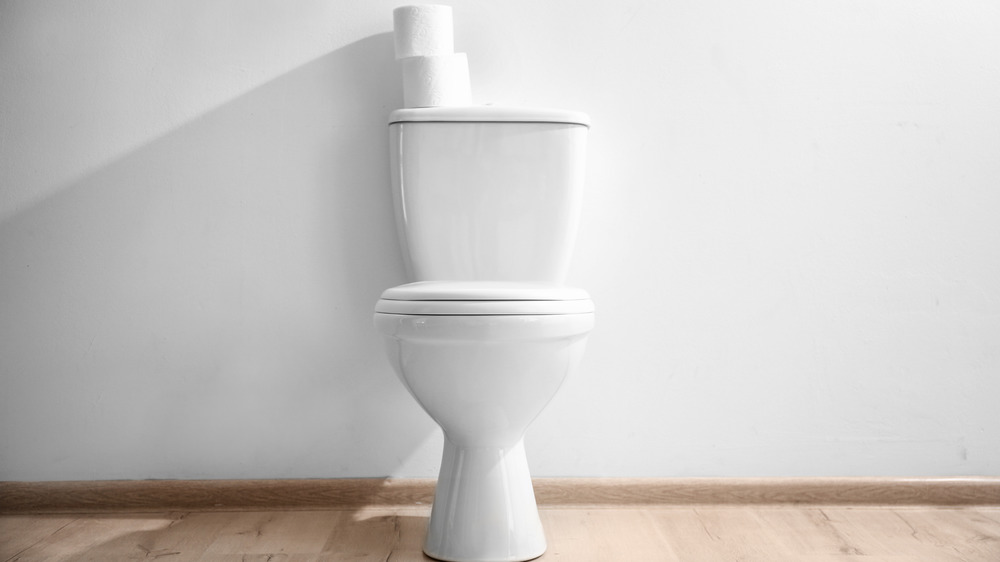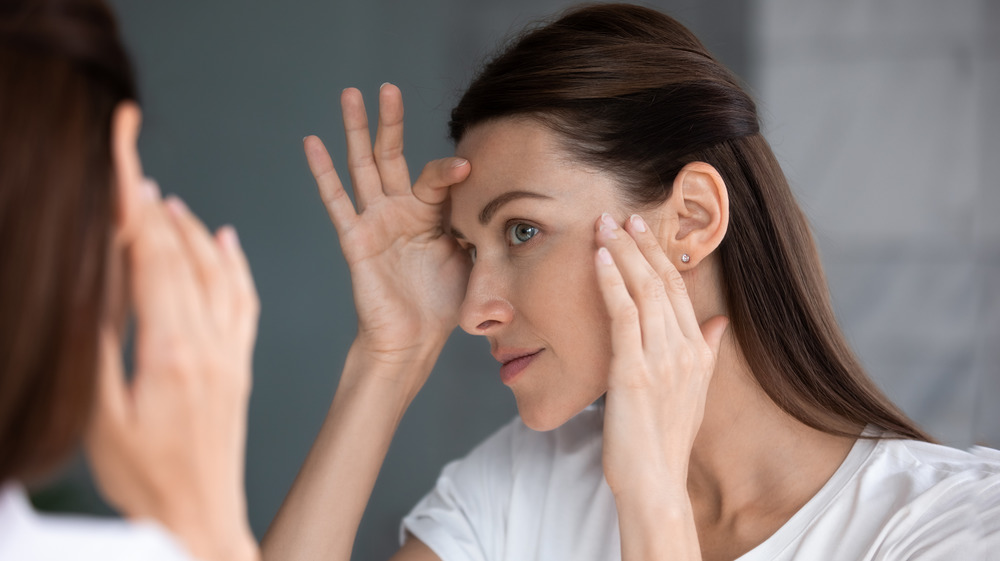Your Body Is Actually Healthy If You Notice These Signs
"Listen to your body" is something you've likely been told. This is good advice considering your body often sends you red flags whenever you're getting sick or your health is declining. These may show up as painful migraines, a weakened immune system, substantial weight loss, hair loss, body aches and pains, or other symptoms indicative of various health conditions.
"The human body has an innate intelligence that is smarter than a supercomputer and strives for optimal health and balance," Michael S. Evangel, a chiropractic physician, told Health Digest. "This balance is referred to as homeostasis. The reason why we are not at our optimal health is a combination of excesses and deficiencies. The body can only do what it is capable of doing when it is given the proper set of circumstances."
Evangel explained that how you feel and how you appear are key indicators of your underlying level of health. "The bottom line is that we should listen to what our body is telling us," he said. But your body doesn't only let you know when things aren't going so well. There are also some reassuring signs that you're in good health.
Your hair and nails are strong
A healthy head of hair may say a lot about your overall health. "Hair is a great marker of overall health," wrote Joy Bauer, a registered dietitian nutritionist, on her site. "Good hair depends on the body's ability to construct a proper hair shaft, as well as the health of the skin and follicles." Without proper nutrition, this construction is impeded. So if your body has the ability to build proper hair shafts, well, it's a good sign.
Meanwhile, your fingernails should be "smooth, shiny, and pinkish," according to Hiba Batoole, a nutritionist with Marham. "Healthy appealing nails assure that you're neither anemic nor at the risk of congestive heart failure. ... A pinkish hue to your nails also confirms the lack of liver disease."
But if your hair is thinning or your nails are brittle and breaking, it's worth assessing your health. Because your body prioritizes resources, and hair and nails are not vital, Michael S. Evangel, a chiropractic physician, told us that "when someone has an undiagnosed condition, the body's lack of attention to these areas can cause that person not to look vibrant or healthy."
Your teeth don't bleed when you brush them
A beautiful smile doesn't only look great, it can also be a positive sign of good overall health. That's because, as Dr. Lilya Horowitz, general dentist and owner of Domino Dental, told Health Digest, "When you keep your mouth clean and in check, your overall immune system performs better."
Loose teeth and tender and bleeding gums are a couple of the biggest symptoms of periodontal (gum) disease, according to National Institute of Dental and Craniofacial Research. But that's not all they can suggest. They may be signs of something more serious going on inside your body, which is why it's important to understand the root cause of poor dental health.
"Plaque buildup and bacteria on your teeth can put additional stress on your immune system," Horowitz explained. "If your gums are bleeding and inflamed, you're at risk for other underlying health issues including heart disease, diabetes, and auto-immune diseases." Conversely, if your teeth and gums are in pretty good shape, you have a reduced risk of these bigger health concerns.
You sleep about eight hours a night
According to the National Sleep Foundation, healthy adults should be getting about seven to nine hours of sleep, on average, but, unfortunately, that's not always the case. And because the quantity and quality of your sleep are both indicators of your overall health, according to Hiba Batoole, a nutritionist with Marham, getting an average of eight hours could be a good sign. "Staying fresh when awake and then having a sound sleep are signs of good metabolic, hormonal, and nutritional health," she told Health Digest.
"Falling asleep easily by about 10 p.m. and getting a solid eight hours of uninterrupted sleep each night is a great indication of good hormone balance," Jen Mayo, a certified holistic health coach, agreed. "Deviations in sleep patterns may be reflective of hormone imbalances, particularly as they relate to your circadian rhythms. Not having to work at getting restorative rest each night and having energy during the day is a reflection of well-balanced health."
Your bowel habits are consistent
Your stool can tell you a lot about your health. If, for example, your bowel habits are changing or the color or consistency of your stool changes, these could be red flags. If, however, your bowel remains relatively normal in terms of what you're used to, it's a reassuring sign. "If you have a regular poop cycle and have not noticed any long-lasting disturbances, your bowel health is perfectly fine," according to Hiba Batoole, a nutritionist with Marham. "People often compare their bowel cycles with others, but everybody has a different cycle. As long as your cycle is regular and not causing any pain or discomfort, your gut is all fine."
Gastroenterology specialist Vasudha Dhar told Everyday Health that the key is to be aware of how your GI tract generally functions and what typical bowel activity looks like for you. He also added that, sometimes, foods don't agree with you, you don't hydrate enough, or you introduce a new medicine to your body, and that can all "change the consistency and caliber of your stool for a short time." So don't freak out.
You're surrounded by good friends
A study published in the Journal of Health and Social Behavior shows that both the quantity and quality of your social relationships affect not only your mental health, but also your physical health. The more people you have around you — and the stronger your relationships with those people are — the more they'll make a positive impact on you. That's largely because, according to Kati VanLoo, certified holistic nutrition and health coach, "Being connected and [feeling] valued by others," whether it be a close group of friends or an intimate partner, can give you a "sense of belonging."
Additional research published in the journal of Developmental Psychology shows that best friends can help you destress. And destressing is important. According to WebMD, 75 to 90 percent of doctor's appointments are for "stress related ailments and complaints." In fact, 43 percent of adults are dealing with health issues related to stress, the site revealed.
You eat your fruits and veggies
If you eat your fruits and veggies, your health is likely to fair better than those who don't eat their fruits and veggies. It's no secret that eating nutritious meals helps to keep your body functioning as it should. And, according to Harvard's The Nutrition Source, making sure that you eat a variety of fruits and vegetables is key, as no single fruit or vegetable provides all the nutrients that your body needs. There are at least nine different families of fruits and vegetables and potentially hundreds of plant compounds that can benefit your health.
"A diet rich in vegetables and fruits can lower blood pressure, reduce the risk of heart disease and stroke, prevent some types of cancer, lower risk of eye and digestive problems, and have a positive effect upon blood sugar, which can help keep appetite in check," according to The Nutrition Source, adding that some non-starchy vegetables may even promote weight loss.
Your skin is clear
Your skin can say a lot about you; after all, it covers over your whole body. "The skin is the largest organ in the body and so, when a person is in good health, it shows obviously," Dr. Omiete Charles-Davies, medical doctor and founder of One Doctor, a health app for finding doctors near you, told Health Digest. If you eat healthy, keep stress to a minimum, and exercise, Charles-Davies said it'll likely show on your skin. However, the opposite is also true. "Things like stress, dehydration, infections, and even a low blood count can give signs in the skin," he explained.
"It is said that our outer appearance is a manifestation of what is occurring within," board-certified dermatologist and contributor at Zelen Life, Dr. Anna Chacon, revealed in an interview with Health Digest. If you are generally healthy, your skin will generally "appear supple, hydrated, not extremely oily, however, not parched dry or ashy," she continued.
You're on top of your emotions
Your mental health is just as important as your physical health, and deteriorating mental health can manifest in a whole host of physical ailments. In fact, mental health disorders are associated with the prevalence and progression of major chronic diseases like diabetes, heart disease, and cancer, according to the Office of Disease Prevention and Health Promotion.
Your emotions are just one part of your mental health, but if you're on top of them, it's a good sign that you have your mental health in check. "We've all got needs — for connection, nurturing, respect, autonomy, to name just a few — and being able to recognize, express, and pursue these creates better relationships and a happier life," Holly Brown, a marriage and family therapist, told The Healthy. Brown added that healthy people also do their best to understand and meet the emotional needs of the people around them by practicing awareness, mindfulness, and empathy.
Your hormones are in check
Hormones are the chemical messengers in your body that travel throughout your bloodstream to your tissues and organs. They affect your physical and mental health — impacting your metabolism, growth and development, sexual function, reproduction, and even mood, according to the U.S. National Library of Medicine's Medline Plus. While both women and men have hormones, hormonal health can be more readily apparent in women by looking at their menstrual cycles.
During a woman's menstrual cycle, hormone levels change to thicken the lining of the uterus and release eggs in ovulation. For women, having a regular menstrual cycle (anywhere between 27 and 35 days) reassures reproductive health. "[Regular menstrual cycles] suggest normal ovulation, and that reflects balanced hormone levels from the brain down to the ovaries," Janet Choi, a reproductive endocrinologist with CCRM-New York told The Healthy. "Women who are unhealthy because they're overweight or underweight tend to have more erratic or even absent periods; the brain shuts down ovarian function and ovulation doesn't happen or happens unpredictably."
You feel energized
Your energy level is a great barometer for your general health and well-being, Michael S. Evangel, a chiropractic physician, told Health Digest. "Being full of energy is a strong indication of good health, just as when someone has a low energy level and is constantly tired, they may be coming down with something," he explained. "The reason that lethargy occurs is that the body is using its energy to try to fight off whatever may be brewing."
Others agree. Kati VanLoo, certified holistic nutrition and health coach, told Health Digest that having optimum energy throughout the day "without the 'afternoon slump'" and being able to move and exercise without pain are good signs. Ideally, "the goal is to feel energized when you wake up in the morning, and maintain a good stable energy level all day," David Borenstein, physician and founder of Manhattan Integrative Medicine in New York, told The Healthy. Indeed, slumps or crashes really shouldn't be a part of your daily routine. Physician Arielle Levitan told the publication, "If you spring out of bed each morning, ready to hit the gym and face the day, you are likely doing pretty well."
You have good blood circulation
Blood circulation is a vital function of the body, according to the Northern Illinois Vein Clinic. It depends on the heart, the body's most significant organ. Smoking and not exercising regularly can take a toll on your body by impeding this function. When that happens, you can suffer from fatigue, limited oxygen flow to the brain (which hurts your memory), hair loss, erectile dysfunction in men, and more. Plus, it'll take longer for cuts and sores to heal, which can increase your risk of infections.
However, people with good blood circulation see a wealth of health benefits. Your heart and lung muscles will function better. Good blood circulation helps to remove waste from your body's organs. And you'll have an easier time fighting off and avoiding diseases. If you're someone who regularly engages in cardio exercises, practices yoga, and gets massages, you probably have better blood circulation than those who don't (via Northern Illinois Vein Clinic).
You have fresh breath
What's happening inside your mouth can be a major indicator of what else is happening inside your body. "Your oral health is a great measure of how healthy you are, strong teeth and healthy pink gums that don't show any signs of gingivitis or inflammation play a major role in your health," Jamie Hickey, a trainer and nutritionist at Truism Fitness, told Health Digest.
Keeping good care of your teeth and cleaning out bacteria that breeds in your mouth doesn't only prevent any problems with your teeth and gums, it also keeps your breath smelling fresh. While bad breath could happen because of smelly foods, it could also be something more. Bad breath can be caused by a whole host of health issues — from gingivitis and periodontitis to tonsillitis, respiratory infections, gastrointestinal diseases, advanced liver or kidney disease, diabetes, according to Harvard Health Blog. Naturally, then, fresh breath is a great sign of the absence of those health issues.
Your urine is almost clear
If you're well hydrated, your urine will be almost clear. It's important that it's neither too dark nor too clear, Dr. Courtenay Moore, a urologist and surgeon with the Cleveland Clinic, told Time. If it's dark, it could mean that you're dehydrated, which can take a toll on your body in multiple ways.
Dr. Harris Lieberman, a research psychologist with the U.S. Army., also told Time that dehydration can negatively affect your overall cognitive function and mood. "We found modest dehydration caused people's moods to deteriorate," he said, adding that dehydration also affected short-term memory and attention. "People also felt more fatigued, and headaches were more common."
On the flip side, if you drink too much water, you can throw your electrolyte balance off. Obviously, this isn't ideal either. Instead, your urine should be a "pale straw color" that suggests healthy hydration levels. "Your body can normally regulate its water and sodium levels pretty well," Moore told Time. "But if your urine is clear and you're peeing 20 times a day, you're drinking water excessively."
Your vision is strong
According to the Cleveland Clinic, strong vision is a strong indicator of good overall health. As it turns out, the eyes may not only be the windows to your soul; they may also be the windows to your health. This is because poor vision can be a result of a number of health conditions. These include injuries to the eyes and disorders like diabetes, age-related macular degeneration, and glaucoma. Low vision can also be a result of eye cancer, brain injuries, albinism, or inherited eye disorders. One 2014 study found that 73 percent of diabetic patients experienced blurred vision as a symptom (via Good Housekeeping).
Dr. Natasha Herz, clinical spokesperson for the American Academy of Ophthalmology, told Good Housekeeping that your eyes can give you an obvious glimpse into your health, even beyond your vision. For example, twitching eyes could be a sign of stress and fatigue, spots on the eyes can be signs of infections, white rings around the iris can be signs of high cholesterol, yellowish patches can be signs of sun damage, and so on. Conversely, clear white eyes with good vision is an indication of good health.














